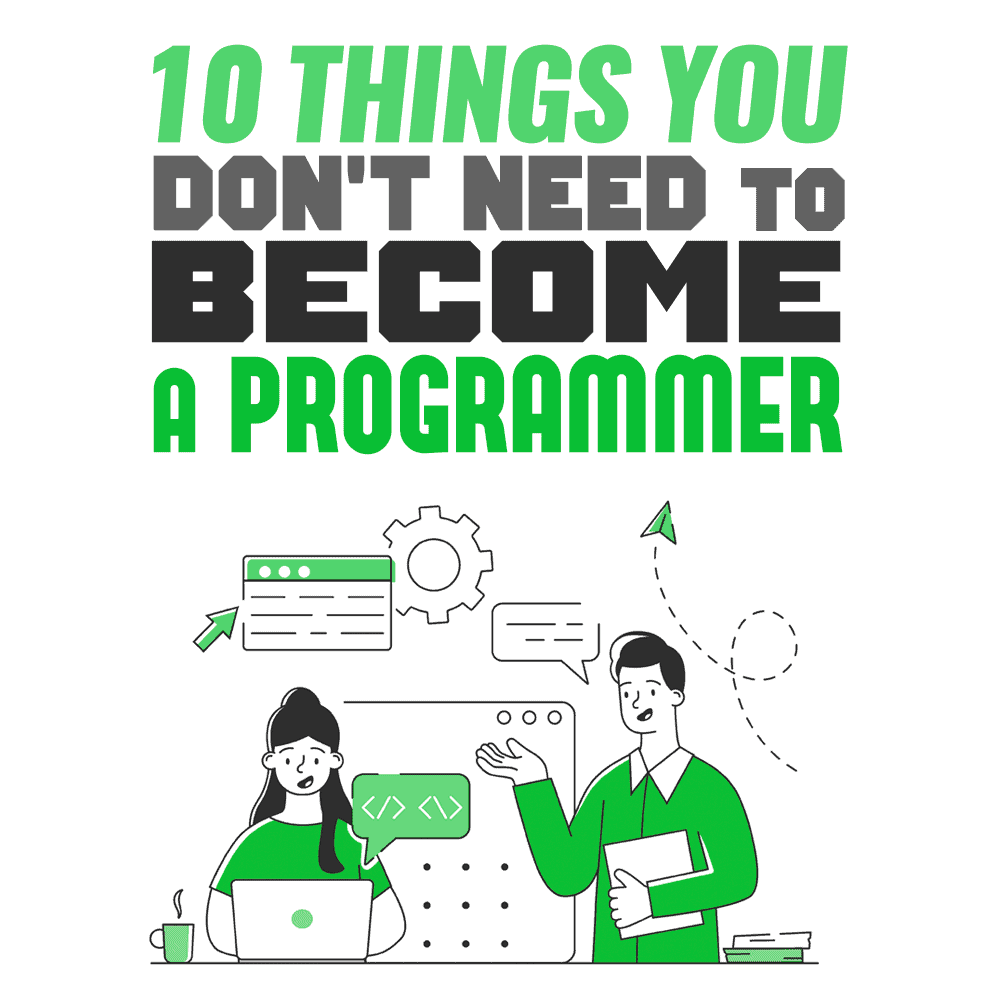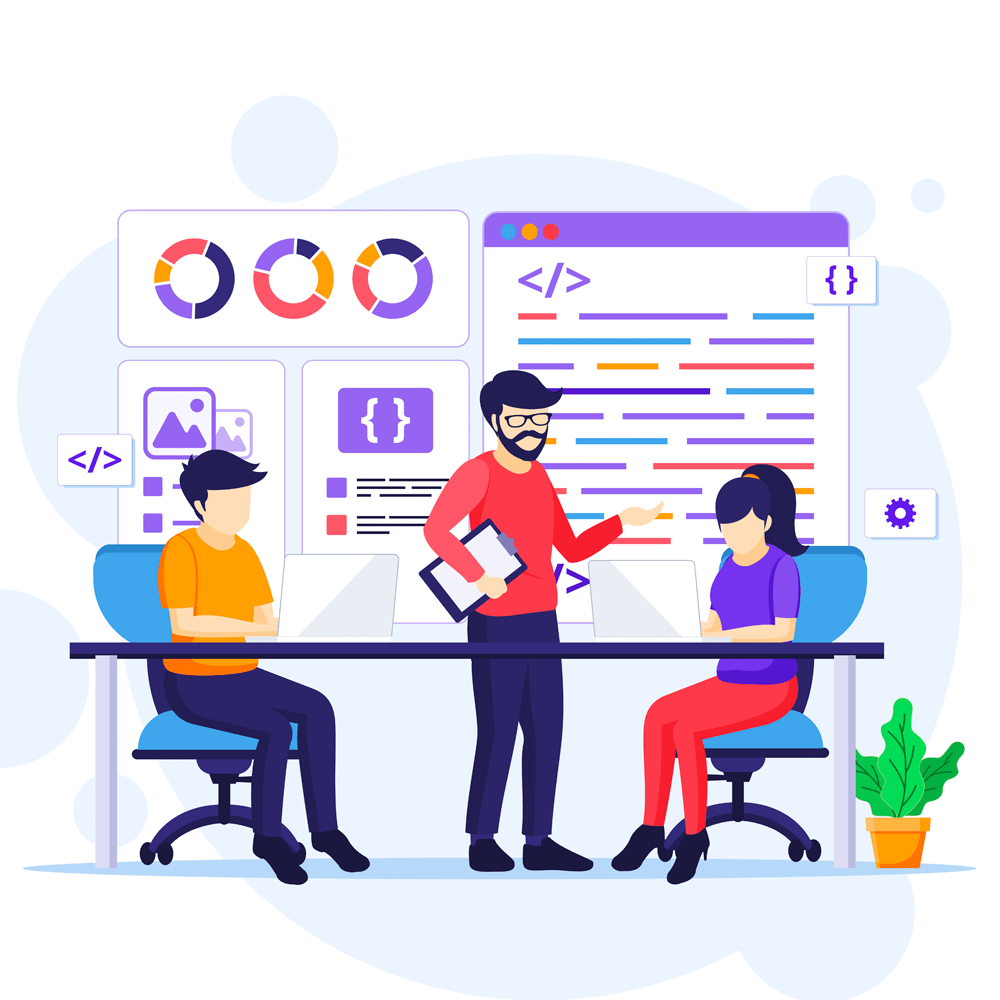 Do you have the passion and urge to become a successful programmer? Most people would say yes but hold a tint of doubt, as they are glued to certain stereotypes surrounding the world of programming.
Do you have the passion and urge to become a successful programmer? Most people would say yes but hold a tint of doubt, as they are glued to certain stereotypes surrounding the world of programming.
This doubt is primarily because of how programmers are portrayed in society. Unlike other professions, programmers have been portrayed in movies as superhuman hackers with no social skills to boot. They’ve spent most of their time in a dark room, avoiding the outside world while staring at a computer screen for hours on end.
While that depiction may work for the movies, it’s far from how actual programmers live their day-to-day lives.
Still, many wanna-be programmers are frustrated by the expectations that they think are required to become a coding whiz. In this post we have compiled an alternative world, or “the real reality,” and listed 10 things you don’t need to become a programmer.
Let’s take a glance and bust some myths about programming!
You Don’t Need Supreme Knowledge About Everything Related to Computers
People keep forgetting that developers aren’t robots. They have blood flowing through their veins, not wires! You do not need to possess calculators instead of brains to become skilled at your job.
Knowledge alone isn’t the only factor when it comes to landing a career in programming. While it can be beneficial, focusing on various computer-related topics can create confusion and may divert you from your actual goal of learning programming, decreasing your chances of getting a job.
In the end, your greatest asset is your passion for programming.
If you are curious enough and have the self-discipline to divert your enthusiasm from other things to programming, you will outshine others.
The vocation is not as complex as one anticipates, as it is a form of communication. Still, the only difference is that you are trying to communicate with the computer instead of a person. The programmer instructs the computer to obey specific commands, using computer language.
You Don’t Have To Be Young To Understand Programming
Walt Disney astutely said that “if you can dream it, you can do it.”
It’s never too late for a new beginning. Many people feel that they are too old to learn to program. Learning how to code a task is just like learning any other subject. With adequate strategy, work principles, and fidelity, anyone can grasp it.
Many people join with little programming understanding, but as long as they put in the necessary work, they can become successful programmers. If you want more motivation, many developers started their careers in their 30s, 40s, and 50s.
There Is No “Best Language”
There is no best programming language that you can learn because no computer language is more favorable than any other. While there are definitely some that are more popular than others, each language has its own place and responsibility. In fact, learning multiple languages is the best way to become more skilled and hirable to project managers.
It is always recommended that you begin with the foundational languages of the web, like HTML or CSS. As you explore further, the pros and cons of each language will become apparent, and you can pick and choose accordingly.
Once you’ve mastered a couple of different programming languages, you can start interviewing for full-time programmer positions. However, mastery doesn’t come fast, and you can always get better. Some of the best ways to do this are through consistent practice and personal projects.
You Don’t Need Expensive Software and Systems
An expensive computer and advanced tools can certainly benefit you in your progressing career path, but these are not essential when you’re just starting out. All you need is an ordinary setup, something you probably already have! A general computer will do the trick.
Your ordinary system is not as typical as you think. All the fundamental functions can be operated using a primary computer. Moreover, free versions of tools are available, and you can easily expand as you go, only upgrading what you need based on where you’re at with your learning.
You Don’t Need a University Degree

There are many coding boot camps available worldwide that are viable alternatives to school. Graduates from these boot camps land jobs as developers, even though they don’t have much programming experience. Many extraordinary programmers with incredible capabilities do not have a college degree yet surpass those with a degree.
Programming is like any profession; if you are good at it, people will pay you for your expertise irrespective of how you got there.
If you’re looking to switch careers and desire a career shift, learning programming by simply using the available online resources is possible. Economic hindrance can also be averted through self-study and other inexpensive options available online.
You Don’t Need To Be an Introvert
One key stereotype surrounding programmers’ jobs is the image of an ultra-nerd introvert programmer. Please believe me when I say that a personality trait is not going to benefit you in this career.
Developers come in a range of moods, shapes, backgrounds, and the combination of all psychological traits. A successful developer is not defined by just one word or perception of one term.
Programmers are determined by the passion for solving things through the tools they have. If they lack any resources, they try to find it through the logical understanding of models and designs. These things have nothing to do with the supposed label of being an introvert.
Being introverted or extroverted doesn’t matter. All you need to have is perseverance and a positive outlook for this profession.
No, Job Recruiters Will Not Necessarily Come To You
Computer programming is a thriving field, and developers are in high demand. It does not necessarily mean that employment will come to the comfort zone of your doorsteps.
Like any profession, competition and marketing prevail in programming. You need to be a proactive job seeker and stay updated about company requirements.
Landing a job as a programmer will need your enthusiastic participation, research, outreach, contacts, and a unique cover letter. To increase visibility, you’ll have to create a job profile, apply for numerous jobs, and show some of your capabilities through sample projects.
Finding a flexible work environment to work in can be a daunting task. Thus, you need to earn your platform with your talents.
There Are No Established Stereotypes
Programming is boring. You need to memorize all the syntax. Programmers can solve hardware problems.
These are all established stereotypes, and they’re all false.
There are numerous associations attributed to a “typical computer programmer.” Some of them are still held by many organizations regardless of the increasing number of people embracing the field.
Many people think that you have to be a genius or a mathematician to be a programmer, but in reality, not all software developers are geniuses. Programming skills are going to get better by devoting time and effort. If you see a programmer with an extraordinary work ethic, it’s always the result of the hard work they put in.
While mathematics is a center of programming, you don’t need it in your routine life. Programming languages are similar to human language and don’t require precise knowledge of calculus.
Some think that programmers should be estranged from the rest of the team, as they are nerds who are incapable of socialization. Others believe that they are people with glasses who have at least five monitors in their room. You get the idea.
This fallacy needs to be broken, as many beginners try to fit into established stereotypes. A handful of them exist, but you should not downgrade your personality to fit into these boxes.
No, It’s Not a Man’s World Without Gender Diversity
Many movies depict only men as professional programmers, believing women are too feminine to touch something as manly as a computer … bleh. Though this attitude is changing, men still dominate the industry.
Many people think that to become a programmer, you should be good at using rational and analytical abilities, which women cannot handle. We should not forget that the first programmer in the world, Ada Lovelace, was a woman.
Grace Murray Hopper (developed the first compiler), Adele Goldstine (helped in the making of the world’s first digital computer), and Marissa Mayor (a programmer at Google) are some of the influential women programmers who inspired other women to pursue this path.
Gender diversity is an integral component to divert bias and enhance decision-making capacity with distinct perspectives. Gender does not influence your skills and what is central to being a professional programmer. Because of this, it should also not influence your ability to land a programming job.
You Don’t Need To Be Isolated

The industry is open and welcome and has created many open-source projects that you can profit from. Many economically backward and minority communities that do not have access to specific resources are slowly flourishing in the field due to its democratic setting. There is no class, sex, or gender bias. Just programming.
Embark on Your Journey To Become a Successful Programmer!
You now know what misconceptions to avoid to become a successful programmer. Do not let these stereotypes get in your way to triumph, and most importantly, do not speculate, saying “people like me can’t.” Anyone can. Anyone with great practice and determination will make it as a programmer.
Top application development companies always promote those who have the true knack for programming. So let go of those typical myths, and pave the path toward becoming a successful programmer with novel intent and perseverance.
